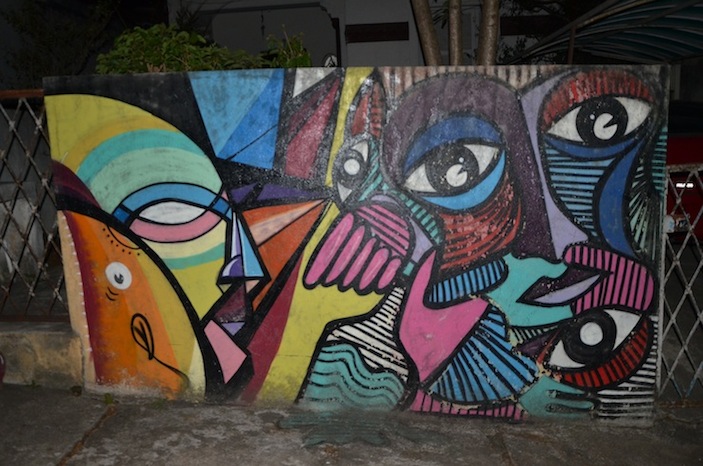Author Archive
IDlondon: Crosswalk
IDmusic: “Ba’t Di Ko Ba Nasabi” by Krizza Neri
This space is dedicated to uncovering the culture of the Philippines, and as such, one must talk about music and romance. I thought I’d share this video–one of the more popular songs in the Philippines in the past few years–by Krizza Neri. She recently won a reality singing contest (“Protege: The Battle for the Big Break”), and this is among her first singles. If I have ever heard a song-video combination that exemplifies the musical culture of a place (in so many ways), this is it for the Philippines!
IDdubai: Loser’s Paradise!
I’m going to get into a lot of trouble with this post, but as the aim of Initial Descent is to offer a true glimpse into every culture, I can’t mince words. To put it simply, if you are a guy who has trouble with personality, you lack personal style, you’re a little on the chubby side without charm to compensate, or struggle with the opposite sex for any other reason, then Dubai is the place for you. The men who live in Dubai , though very diverse, all seem to have one thing in common: a girlfriend (or three) who would be way out of their league in their country of origin.
See, Dubai (along with counterparts Abu Dhabi, Doha and to some extent, virtually every other major Middle Eastern city for which this post would also apply) is a transitional place for most. It is a place people, mostly men, come from far and wide to make more money than they are probably worth, live a higher class lifestyle than they are probably accustomed to, flirt with more beautiful girls than they would be capable of meeting anywhere else, and ultimately return to their home countries a few years later—with more wealth and more notches on the bedpost. Oh, and in some cases a wife who, as referenced above, would otherwise be out of their league.
On the flip side, Dubai is full of women who come to follow dreams—specifically, in the tourism industry. While not many men do, there are women all over the world who dream of becoming a flight attendant, which in many cultures is considered to be among the more glamorous jobs, or working in an international hotel. Often, it is a dream that has lingered since childhood, influenced by visions of seeing Paris, New York and Rome—and getting paid for it. This is quite convenient for the men of Dubai (including those male flight attendants who seem to have figured the “fringe benefits” of the job out), as the city happens to be home to one of the largest and fastest-growing airlines in the world. And, having worked for one before, I’d be remiss to say that physical appearance is not one of the critical criteria that goes into the hiring decisions of most Middle Eastern airlines. On top of the thousands of girls Emirates employs, there are the countless hotel and other tourism staff, who have jobs that constitute the next best thing (to flying) for most.
While the simple concentration of attractive women here is the main factor working in men’s favor, the other major piece of the puzzle is that, inevitably, everyone who moves to Dubai for work—thousands of miles away from home for most—gets lonely. No matter where you are from, there is a culture shock, and not many comforts of home. And when loneliness sets in, and we don’t have our closest friends or family to cuddle up with, it’s human nature that we simply are drawn to another warm body to help distract us from our loneliness. Apply this homesickness to the beautiful women here, who often see the men that chase them around as “comfort zones” that happen to be in Dubai when they need someone in Dubai, and typical evaluation processes take a back seat. The women become attached emotionally; the men seem to be much more motivated by other factors, and usually the result isn’t pretty. But where else on earth do situations exist where men are actually treating women who are actually above their league as completely disposable? This is one of the more amazing elements of expatriate culture here. And yes, as with anything in life, there are exceptions to the general observations expressed in this post.
While there certainly are beautiful people of both genders in Dubai, much more of these happen to be of the female gender, many of whom are lonely, missing home, and looking for emotional support. Do the math, and it means that no matter what a guy may or may not have to offer, he more than likely has a model-looking girl on his arm.
Enjoy Your Efes Here; You Won’t Find Much Else!
Every country has their own local beers—as the drink is enjoyed virtually all around the world. If you’re like me, you like to sample them as well, enjoying your Sapporo in Japan, your Brahma in Brasil, or your Guinness in Ireland. But few beer manufacturers anywhere enjoy quite the prominence that Efes (short for Ephesus) has in its native Turkey.
The pilsen beer is not only known in Turkey, as it is the 5th most popular European beer based on production and the 8th-most popular by sales volume. But within Turkey, the brand enjoys an astonishing 82 percent market share, and sponsors seemingly everything, including the national basketball team and the first Turkish futsal league.
While the majority of consumption is of its flagship pilsener, the Efes portfolio includes Efes Dark, Efes Light, Efes Xtra, Efes Ice and Efes Dark Brown.
So when you’re here, make sure you enjoy an Efes, because you’ll be hard-pressed to find anything else!
IDtokyo: Dolphin
How Ghana Sets and Example for the World to Follow in Religious Tolerance
Independent now for just over 50 years, Ghana has become a model for the world in the area of religious tolerance. With a population nearly equally divided among Christianity, Islam and traditional religions, it is truly remarkable how Ghanaians are both so passionate about their individual religions—celebrations are very outward here—but tolerant of others. The mantra that it doesn’t matter where one comes from or what he or she believes in—when in Ghana he or she will be welcomed and treated as Ghanaian—is something this nation lives and breathes every day.
It is even common to have a peaceful religious divide within families—traditional parents with Christian children who are happy for their Muslim cousins’ success. This harmony is evident from the top-down as well, with a government that for the past half-century has strongly supported religious freedom. While Christian holidays like Christmas and Easter are national holidays here, as they are in many countries, so are Muslim holidays like the Idul Fitr and Idul Adhia. Because they are acknowledged and people here have a basic knowledge and understanding of another belief, there is not the fear and impending hysteria it has created in much of the world.
This is thanks in large part also to the Ghana Peace Council, which was created by the government to raise awareness surrounding the use of nonviolent strategies in response to conflict through networking, coordination and campaigning. The 11 members include the most prominent members of the Catholic, Muslim and traditional religions in Ghana, as well as some top legal and business professionals, academics and youth representatives. During its existence, this group has built an impressive track record, with one of its most important duties being to decide otherwise-deadlocked national elections. In one notable example, the leader of the group—the head of a Muslim mission—made a deciding vote against the political party he personally supported, because through deliberations with the entire group it was evident that the opposing party would better serve Ghana at the time. Such sacrifice of one’s personal beliefs for the betterment of a nation surely has a trickle-down effect, providing an example that is difficult for individuals to go against.
Ghana may have its share of problems, but when it comes to religious tolerance, it is truly a nation to behold.
IDsãopaulo: Vila Madalena
IDoslo: Riks Toto Horse
That’s Che to You, Amigo…
Next time you hear someone cry out “Che!” while you’re walking down the street in Argentina, no, you don’t need to start looking around for the guy you’ve seen on all of those t-shirts and posters in your college dorm. Che Guevara has not returned from the dead, and you can probably just ignore it, unless, of course, that cry is directed towards you.
See, “che” doesn’t only refer to the famous 20th-century Argentine revolutionary, and in Argentina, that association is made very rarely. Instead, “che” is used informally much in the same way native English speakers use “dude”, or ‘hey”, as an attention-grabber. Especially among friends or family, the phrase can refer to someone specifically or rhetorically, so while you don’t need to excitedly whip your head around looking for the real Che, make sure nobody is talking to you either before ignoring the call.
While the origins of the word to the Argentine culture (as well as neighboring Uruguay, where it is also very popular) is unclear—linguists often argue whether it stems from an indigenous language to the region or whether it was brought along with northern Italian immigrants—that it is hugely popular in Argentina today is not.
.jpg)







